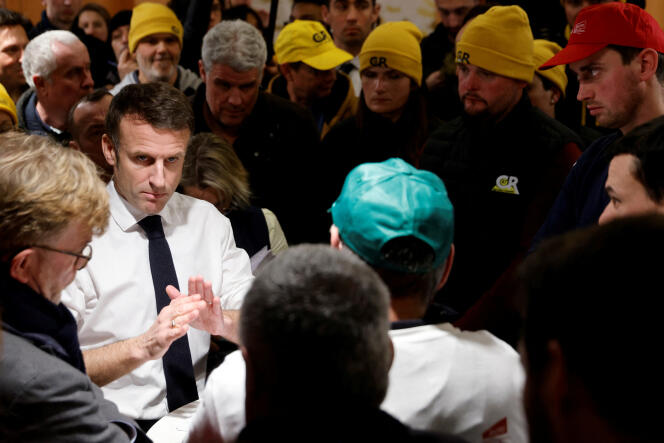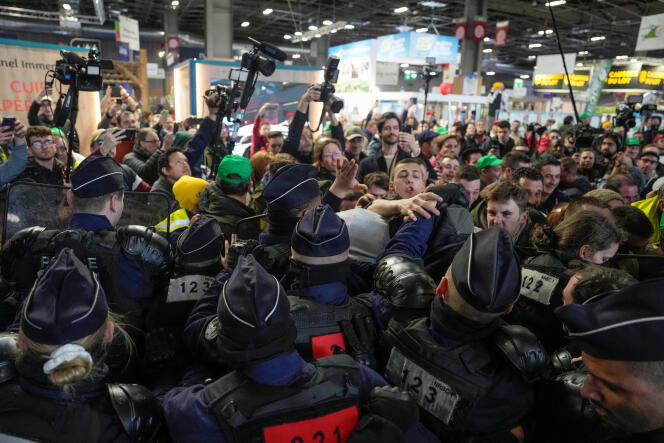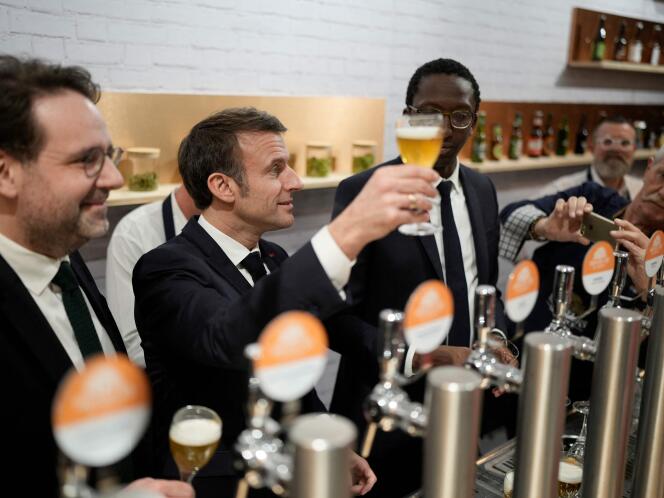


Emmanuel Macron ended a 13-hour visit to the Salon de l'Agriculture on Saturday evening, February 24, a visit marked by booing and clashes of a rare intensity, after the government had tried for a month to appease the farmers' anger before their major annual event.
"Who would have said this morning that 12 hours later, we'd find ourselves still here continuing to work, moving forward?" said Macron just before 8 pm, satisfied to have browsed the whole event despite a chaotic start, and quipping, "It's ridiculous for farmers to have used violence at a show that's theirs."
Before the official opening, hundreds of people led by farmers from the main unions forced their way into the Porte de Versailles exhibition center in Paris. They burst into the main hall, sparking clashes with the police. At the same time, at around 8 am, Macron was meeting with a number of agricultural union leaders on the second floor. After a press briefing during which he called on the demonstrators to remain calm, the president improvised a debate lasting almost two hours with representatives of the sector – the majority of whom were heads of representative organizations.
During the sometimes tense exchanges, Macron was questioned about the consequences of the war in Ukraine, administrative simplification, green measures seen as "punitive" by some farmers, and farmers' remuneration. "It's wrong to say that it's in the process of falling apart," asserted Macron, urging "not to paint a catastrophist picture of our agricultural sector."
In particular, the president announced that the agricultural orientation bill, which had already been postponed on several occasions, would be presented to the Council of Ministers on March 20. He also announced his intention to set a base price "sector by sector." "There will be a minimum price, a floor price, below which the processor cannot buy and the distributor cannot sell," he promised. Macron also mentioned the creation of an "emergency cash flow plan" as early as this week to relieve farmers and a meeting on the subject at the Elysée in three weeks' time.
But the image that will remain from the big opening of the fair is that of police officers and mobile gendarmes in helmets and shields, trying to contain angry farmers who were inveighing against the head of state.
When Macron eventually descended, more than four hours late, to inaugurate the Salon and begin his visit, the insults flew ("manure," "liar"), along with jeers and calls for his resignation. Laurent Nuñez, the Paris police prefect, estimated there were between 300 to 400 demonstrators in the morning. He reported six arrests as well as eight injuries among the forces of order.

Arnaud Rousseau, president of the the largest union, the FNSEA, said on French television channel LCI later that evening that he had heard during the day "a certain number of advances that we are delighted with," in particular the prospect of a "cash flow plan" drawn up from Monday for farmers in difficulty, and the willingness to recognize in the law that agriculture is of "major general interest." "It was probably necessary to go through this moment of anger," said the union leader.
Calm finally returned in the afternoon, with the hall where Macron continued his visit placed under a security cordon. The contrast between the sparse aisles around him and those packed into the other pavilions was striking.
The chaos delayed the opening of the show to visitors and greatly complicated access to the most popular hall, the Animal Show, which was the scene of the morning clashes with police and booing. Nevertheless, the first day of the 60th Salon de l'Agriculture was a busy one, with many people crowding into the aisles not closed to the public.
"Discussing the concept of a floor price is already a small revolution," hailed Laurence Marandola, spokesperson for the Confédération Paysanne, the union opposed to intensive farming that is behind this demand. This minimum price for milk or beef would go further than the current EGalim laws, which are supposed to guarantee farmers a given remuneration in contracts with manufacturers and supermarkets. The government wants a new EGalim law by the summer.
The FNSEA remained skeptical: "From one region to another, we don't have the same charges (...) we don't want the minimum price, because it would hold us down and eventually bring us back to the agricultural minimum wage," Luc Smessaert, one of the union's vice-presidents, told TF1 television channel. As for the major general interest of agriculture, a source within the government said this "carries legal consequences." This was one of the FNSEA's demands and could, for example, facilitate the construction of projects dedicated to agricultural irrigation despite the presence of protected species.
Macron also set the ball rolling for a long-distance clash with the far-right Rassemblement National (RN), ahead of the European elections in June, when the party is announced as the favorite in the polls. On the eve of RN president Jordan Bardella's visit to the Salon, Macron condemned a "project of degrowth and stupidity" that would involve "getting out of Europe."

Macron then went on to directly criticize the RN, saying in particular: "I'd like to see a project that explains to people that we're going to close the borders and that the others are going to keep opening them for us, but that doesn't exist (...) You can't bullshit farmers, you've got to stop."
Macron finally reiterated the measures he intends to put in place in response to farmers' anger. The most notable of these is the continued application of the EGalim law by installing price indicators in all sectors, which is not the case today, as well as the creation of a European regulation on central purchasing bodies to combat the bypassing of commercial negotiations in France.
The exchange with the press ended with an invitation to go for a drink. "We're going to have a drink at the brewers'," said Macron. The presidential motorcade left Porte de Versailles an hour later.
Translation of an original article published in French on lemonde.fr; the publisher may only be liable for the French version.
